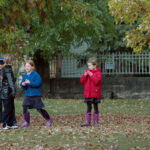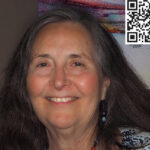Home »

Vigna’s Bull Head gripping mountain gothic literature
Interview with author John Vigna
By Bob Ede
 I was initially interested in John Vigna’s new book, Bull Head, because it was set in the Elk Valley area. What I found was short stories with characters; similar to many I have known while living in the East Kootenay. Characters as rugged as the place they inhabit. The stories in Bull Head are brutal, tender and tragic.
I was initially interested in John Vigna’s new book, Bull Head, because it was set in the Elk Valley area. What I found was short stories with characters; similar to many I have known while living in the East Kootenay. Characters as rugged as the place they inhabit. The stories in Bull Head are brutal, tender and tragic.
I wanted to know how an author was able to find these stories. So, I asked him, and John was kind enough to answer.
Bob Ede: Tell us a little about yourself.
John Vigna: I started writing semi-seriously while living in the Elk Valley in the late 1990s, sporadically publishing pieces for a local magazine in Fernie and the East Kootenay Weekly. I had moved from the Bow Valley, where I had worked as a bookseller. But prior to that, I played and coached basketball professionally in Vienna, Austria.
I’m not tall, nor was I particularly quick for my size, but I had good court vision, a better than average jump shot, and a constant desire to improve. I put in thousands of hours alone shooting hoops in a gym or on a playground, regardless of day, time, or weather. The discipline and willingness to work hard alone for years were perhaps the most valuable skills I took away from a life in sports. Only when I started writing, did I realize how much life as a basketball player defined and influenced my writing life.
Writing is such a tough and demanding undertaking mentally, emotionally, and physically – I’m constantly amazed at how taxing sitting at a desk is (I’m not kidding). I’m sure I would have given up a long time ago if it were not for having the experiences I had as an athlete.
BE: Your book, Bull Head was published in the fall of 2012 and has been greeted by glowing reviews throughout Canada. I am sure this book has lived with you for some time. How does it feel to have Bull Head published to such praise?
John Vigna: I am incredibly fortunate to have had such a positive response to this book. It’s overwhelming, really, and surprising because it’s not easy subject matter to warm to; these characters are not feel good people. But it’s encouraging to see readers connect with these men, and to be affected by these stories. I’ve been humbled by the response so far.
BE: How did you find the voices of the characters that occupy the stories in Bull Head?
John Vigna: I am drawn to southern writers such as Sherwood Anderson, Flannery O’Connor and William Faulkner. In reading them, I was intrigued by how they created fictional, composite worlds from a landscape that left a great impression on them. Cormac McCarthy, another influence, of course does the same. For these writers, the sense of “my apocryphal country” is one that resonates with me when I think of the Elk Valley, where Bull Head is set.
The Elk Valley, as you know well, is an area founded on violence and betrayal against the harsh landscape of the Rocky Mountains. Legend and folklore have it that the area was also cursed in the late 1800s by a First Nations Chief’s wife, a curse that haunted the valley until it was ceremonially removed in the 1960s. Yet, during this time (and since), the valley has been the backdrop for dozens of man-made and natural disaster such as mining explosions, fires, floods, avalanches, murders, bizarre suicide attempts that ended up becoming second degree murders, pine beetle devastation, etc.
It is this landscape, this history, this curse that shapes the people of the area, for better or worse – all of which I’m deeply interested in as I map my own Yoknapatawpha County called Bull Head. Without a doubt, the fictional and composite version of the landscape will continue to be a strong character and voice in my future work.
BE: Bull Head is often violent. I understand you toned down the violence before publishing some of the stories. Why did you do this?
John Vigna: I don’t think I’ve toned down the violence and can’t think of any reason for wanting to do so. I am unapologetic about the violence in these stories simply because it plays a deeper role than being violence for violence sake, which is something we see far too much on TV nowadays. I want the reader to be taken out of their comfort zone and to confront a world either like their own or one they can’t imagine. I want readers to be challenged.
I’ve crossed paths with some angry, violent guys and if there’s one thing I’ve learned, it’s that part of their violence and anger stems from the fact that others see them that way, rather than as the men they are trying to be. Of course, there are other reasons they behave the way they do, especially considering their environment, family, and friends. But in the end, they are struggling against the person they are and the person they are trying to be, a friction within that can result in hostility.
At times I found spending too much time with some of my characters, especially the ones in “South Country,” to be suffocating and dark. I needed to take constant breaks. It is any wonder that story got finished.
BE: The stories in Bull Head are centered in a fictionalized version of the Elk Valley area. How did you become familiar with the area and why did you set the stories here?
John Vigna: I lived in Fernie for a couple of years nearly a decade ago, which left a deep impression on me, as did spending time moving around different rural communities across Northern BC, Vancouver Island, and the BC Interior.
Much later, after I settled in Vancouver, when I started writing these stories, I decided to base them geographically in the Elk Valley in the southeastern corner of B.C. Residents of the area, as you know well, are surrounded by the Rocky Mountains and the Kootenay’s, tight valleys and rivers, the Alberta and the US borders. Employment for everyone has traditionally been tied to the landscape. A life that is uncompromisingly difficult and demanding.
As newcomers discovered the area, they began to replace the traditional means of earning a living (mining, forestry, etc) with jobs in tourism, at the ski hill, at the resorts, or construction (housing prices in the Elk Valley have skyrocketed in the last decade). The tension between newcomers and old-timers (or townies, and I mean that affectionately) has often been prickly. The characters in this book often grapple with this changing of the guard.
BE: The stark beauty of the area runs deep throughout Bull Head and ties the characters to the land, sometimes, to their own detriment. There is something rare and special about people who work and play, love and bleed in the same place. What drew you to write about these characters?
John Vigna: While growing up, at least once a month, my parents took my brothers and I to visit my grandparents in the Crowsnest Pass. My grandparents were immigrants who came to Canada with one or two small trunks carrying their possessions and their own sense of adventure. The fact they could carve out lives for themselves, setting the foundation for my parents’ generation and ultimately for my own generation, is not something I take for granted. Their lives were hard; the challenges they faced constantly were enormous. I see the characters in Bull Head as coming from similar families, which makes it easier for me to have a willingness to connect with their lives.
BE: The characters within Bull Head know the difference between right and wrong yet frequently pick the wrong path. Brian, for instance, in the story “Pit Bulls,” seems unable to help himself. How did you find empathy for a character without many redeemable qualities?
John Vigna: The role of men has undergone a tremendous shift over the last few decades, much of it in response to the changing roles of women. I think men are struggling with what it means to be a man. There are new criteria, changing daily, and men are slow to keep up. We seem to be confused, perpetually, at what our role is now, how to cope with it, and how to feel a sense of importance or relevance nowadays.
Violence seems to be, in part, a basic, primal response to this confusion. The men in Bull Head, like Brian, while aspiring to do the right thing, struggle with their own relevance in every move they make, and often make choices the rest of us would scratch our heads at. And these choices lead to the tight binds they get themselves into. Violence is one response to something they have ultimately done to themselves. It’s a violence that is directed at themselves as much as it’s directed at society for the changing role they find themselves uncomfortably negotiating.
In the end, regardless of what the consequences are, these men stand by their decisions and in that way, they try to hold onto some traditional sense of what it means to be a man, what they would have learned from their fathers and their father’s fathers. Whether or not it works for them, well, that’s what the stories speak to.
BE: In the title story ‘Bull Head,’ there is a clash between neighbors, one who has lived in the area for generations and a newcomer. It is a clash between the old ways and the way things have become. Are the characters in Bull Head ‘stuck’ in the past?
John Vigna: Most definitely. There is an old world type of code of conduct or order that these men follow. It’s tough for them to move on and evolve with the rapidly changing world around them because to adapt means to consider their own roles. And their own roles are the very thing that require change if they are to keep up. It’s not necessarily easier for them to remain stuck in the past, but it’s more familiar and safe.
BE: Many authors draw the events in their books from what they know personally. In what ways did you use your life experiences to influence your writing?
John Vigna: I think all writers use their life experiences in one way or another when working on a book. This isn’t to say that they write from life, but that they consider and are haunted by much of their own experiences, those of others, etc. And when they set out to map a fictional world, they draw upon these emotional truths to bring veracity to their characters. It’s always a great compliment when readers ask you how much of your fiction is based on real life because it touches on the fact that they believe very much in the world you created, as if the writer experienced the events of it. The world feels real to the reader.
BE: Most of your characters within your book are male and the stories are told from their perspective. However, that is not the case in the story ‘Cutblock’ where the main character is a female. She is a vivid, complex person. What obstacles did you have to overcome writing about a female?
John Vigna: I wanted to offer a story from a female character’s point of view to give another voice to the men in the book, but also to show how a female might respond to a certain type of man that promises her everything and in the end is unable to fulfill that promise. One of the biggest obstacles in this story was in not naming the characters, while trying to avoid casting them as ‘types’. And also how to flash forward to the future after the majority of the story takes place in the present.
BE: Your publisher, Arsenal Pulp Press, correctly states, Bull Head pays ‘homage to the great Southern Gothic tradition’. Are you a fan of the authors of this literature?
John Vigna: I deeply admire the southern gothic stylists and there is no question they have certainly influenced my work. I think it’s more accurate to classify Bull Head as a western Canadian gothic book, if not prairie gothic, or even mountain gothic. There are many Western Canada rural communities with characters much more strange and colourful than the ones I’ve depicted in the book. How could there not be? When people from small rural areas deal with the challenges of living with a harsh and brutal beauty, something powerful results that is often strange and curious.
BE: You are married to Vancouver author, Nancy Lee. How would you describe your ‘professional’ relationship?
John Vigna: I think it’s safe to say we are each other’s biggest fans and mentors.
BE: Thanks for doing this interview. Are you working on any other projects right now?
John Vigna: I’m in the early stages of drafting a novel that shares the same landscape as the stories in Bull Head.
Bob Ede is an Invermere-based writer and photographer and devoted backcountry trekker.
Top photo courtesy: Nancy Lee







